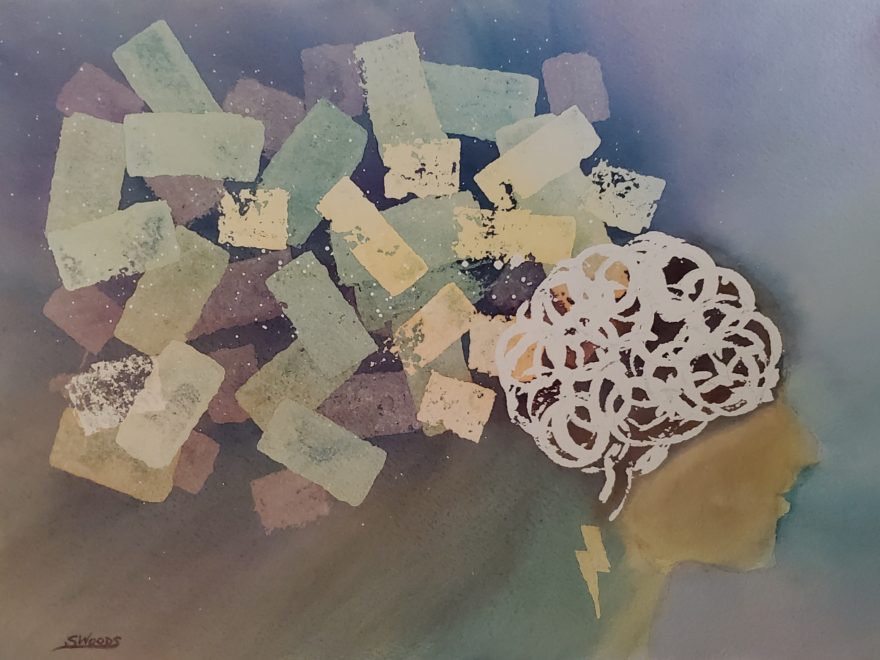“Bringing people together, inspiring, soothing and sharing: these are the powers of art” (1) according to the Director-General of UNESCO, the United Nations Educational, Scientific and Cultural Organization. Today is World Art Day, a UNESCO “celebration to promote the development, diffusion and enjoyment of art” (2), and a lovely opportunity to talk about why art is important… to each of us.
Given my own journey – from a career in bioethics and healthcare to becoming a volunteer Patient Partner and advocate for chronic pain, disability, and rare diseases – I’m most interested in the health benefits of art.
As an emerging artist, I’ve also had many conversations with other artists about the benefits that they feel from their own art practice.
You may even have noticed that my motto is “Art Despite Pain“.
We now have clear evidence that there are indeed health benefits, from either creating or appreciating art; whether literature, the performing arts, or visual arts.
As a specific example, using the visual arts:
Research has shown that a trip to the art museum can give a serious boost to mental health and wellbeing. A recent study suggests that those benefits may translate for digital art.” (3)
As someone who lives with both a ‘mild cognitive impairment’ and high-impact or severe chronic pain, resulting from the same rare disease, I’m also intrigued by the benefits of the arts on our brains and our cognitive health:
when we make art… we increase the brain’s plasticity — its ability to adapt in response to new experiences…
The link between arts and academic achievement has been noted by educators for many years. But it’s only in the past couple of decades that technology has allowed scientists to see some of the changes in the brain that explain why.” (4)
Increasing numbers of medical associations and chronic pain research groups have begun recommending professional art therapy as a means of coping with chronic pain. As for my cognitive impairment, even the Arts and Neuroscience Networking Group (ANNG) of the American Congress of Rehabilitation Medicine (ACRM) now supports art creation:
A lot is happening both in the mind and the body when we make art, and it can be used for therapeutic means, both in rehabilitation medicine and on your own.” (5)
That’s more or less what I’ve been doing on my own since 2021, learning to paint with watercolours, to sketch, and to draw as a form of DIY movement-therapy and brain-plasticity training. I can’t tell whether my new art practice has made any difference in my cognitive impairment, but I do know that I’ve fallen in love with watercolour painting!
On that note, thanks so much for stopping by. Feel free to reach out or to leave a comment over on Instagram or Twitter – managing the Comments feature here on the blog got to be too overwhelming for my cognitive impairment, with all the spam coming in. But I do love to hear from you! Keep safe, stay well, and maybe do something artistic to mark World Art Day today!
References:
(1) UNESCO: Director-General, 2017-current (Azoulay, Audrey) [3391]. Message from Ms Audrey Azoulay, Director-General of UNESCO, on the occasion of World Art Day, 15 Apr 2021 (Programme and meeting document). Document code: DG/ME/ID/2021/17; English version. 15 Apr 2021. Online: Accessed 15 Apr 2023:
https://unesdoc.unesco.org/ark:/48223/pf0000376804_eng
(2) UNESCO. World Art Day. Webpage. English version. Undated. Online: Accessed 15 Apr 2023:
https://www.unesco.org/en/days/world-art
(3) Delgado, Carla. How Does Viewing Artwork Online Benefit Your Mental Health? Discover (magazine). 19 Dec 2022. Online: Accessed 15 Apr 2023:
https://www.discovermagazine.com/health/how-does-viewing-artwork-online-benefit-your-mental-health
(4) Jon Hamilton. Building a better brain through music, dance and poetry. NPR (National Public Radio): All Things Considered. 03 Apr 2023. Online: Accessed 15 Apr 2023:
https://www.npr.org/sections/health-shots/2023/04/03/1167494088/your-brain-on-art-music-dance-poetry
(5) Arts and Neuroscience Networking Group (ANNG). How The Brain Is Affected By Art. Rehabilitation Medicine. American Congress of Rehabilitation Medicine (ACRM). Undated. Online: Accessed 15 Apr 2023:
https://acrm.org/rehabilitation-medicine/how-the-brain-is-affected-by-art/

